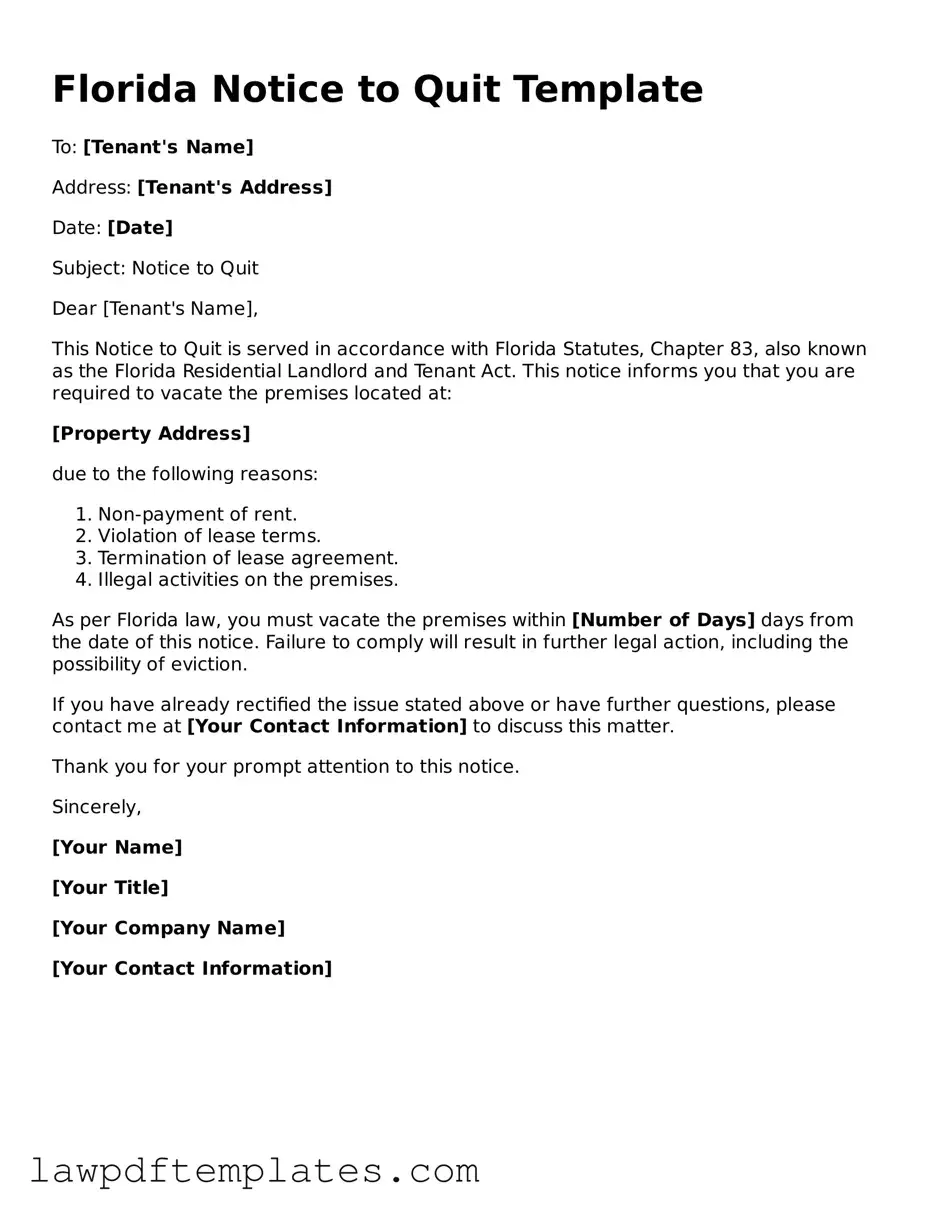Free Notice to Quit Template for the State of Florida
Form Breakdown
| Fact Name | Description |
|---|---|
| Purpose | The Florida Notice to Quit form is used to inform a tenant that they must vacate the rental property. |
| Governing Law | This form is governed by Florida Statutes, specifically Chapter 83, which outlines landlord-tenant relationships. |
| Notice Period | The required notice period can vary based on the reason for eviction, typically ranging from 3 to 30 days. |
| Delivery Methods | The notice can be delivered in person, by mail, or posted on the property, ensuring the tenant is aware. |
| Tenant Rights | Tenants have the right to contest the eviction in court if they believe it is unjust or if proper procedures were not followed. |
| Signature Requirement | The form must be signed by the landlord or their authorized agent to be considered valid. |
| Response Options | Upon receiving the notice, tenants can either comply, negotiate, or respond through legal channels. |
| Documentation | It is crucial for landlords to keep a copy of the notice for their records and any potential legal proceedings. |
| Legal Assistance | Landlords and tenants may benefit from seeking legal advice to ensure compliance with all relevant laws and procedures. |
Sample - Florida Notice to Quit Form
Florida Notice to Quit Template
To: [Tenant's Name]
Address: [Tenant's Address]
Date: [Date]
Subject: Notice to Quit
Dear [Tenant's Name],
This Notice to Quit is served in accordance with Florida Statutes, Chapter 83, also known as the Florida Residential Landlord and Tenant Act. This notice informs you that you are required to vacate the premises located at:
[Property Address]
due to the following reasons:
- Non-payment of rent.
- Violation of lease terms.
- Termination of lease agreement.
- Illegal activities on the premises.
As per Florida law, you must vacate the premises within [Number of Days] days from the date of this notice. Failure to comply will result in further legal action, including the possibility of eviction.
If you have already rectified the issue stated above or have further questions, please contact me at [Your Contact Information] to discuss this matter.
Thank you for your prompt attention to this notice.
Sincerely,
[Your Name]
[Your Title]
[Your Company Name]
[Your Contact Information]
Common mistakes
Filling out the Florida Notice to Quit form can be a straightforward process, but many individuals encounter common pitfalls that can complicate their efforts. One frequent mistake is failing to provide accurate tenant information. This includes the full name of the tenant and the correct address of the rental property. Omitting or misspelling these details can lead to delays or even dismissals in legal proceedings.
Another common error is not specifying the reason for the eviction. The Notice to Quit must clearly state why the tenant is being asked to leave, whether it’s due to non-payment of rent, lease violations, or other reasons. Without this crucial information, the notice may be deemed invalid, prolonging the eviction process.
Many people also overlook the importance of including the correct date on the notice. The date should reflect when the notice is being served, and it should align with the required notice period as per Florida law. An incorrect date can lead to confusion and may invalidate the notice.
Additionally, some individuals fail to understand the required notice period. Florida law mandates specific timeframes depending on the reason for eviction. For example, a non-payment of rent typically requires a three-day notice, while lease violations might necessitate a seven-day notice. Not adhering to these timelines can severely impact the eviction process.
Another mistake is neglecting to sign the Notice to Quit. A signature is essential, as it verifies that the notice is legitimate and has been issued by the landlord or property manager. Without a signature, the notice may not hold up in court.
Furthermore, many people do not keep a copy of the notice for their records. Documenting the process is vital for both parties involved. Having a copy can serve as proof of the notice being served and can be helpful in any future legal proceedings.
Lastly, failing to deliver the notice correctly is a significant error. The Florida Notice to Quit must be served in a manner that complies with state law, whether through personal delivery, certified mail, or posting on the property. Incorrect delivery methods can lead to disputes about whether the tenant was properly notified.
Discover More Notice to Quit Templates for Specific States
Eviction Complaint Form Ohio - Understanding the implications of a Notice to Quit can empower both landlords and tenants.
To successfully establish a corporation in Illinois, one should carefully consider the necessary Illinois Articles of Incorporation process, which outlines the fundamental aspects needed for legal compliance.
10 Day Notice to Quit Nc - Tenants should carefully review the contents to ensure all information is accurate.
